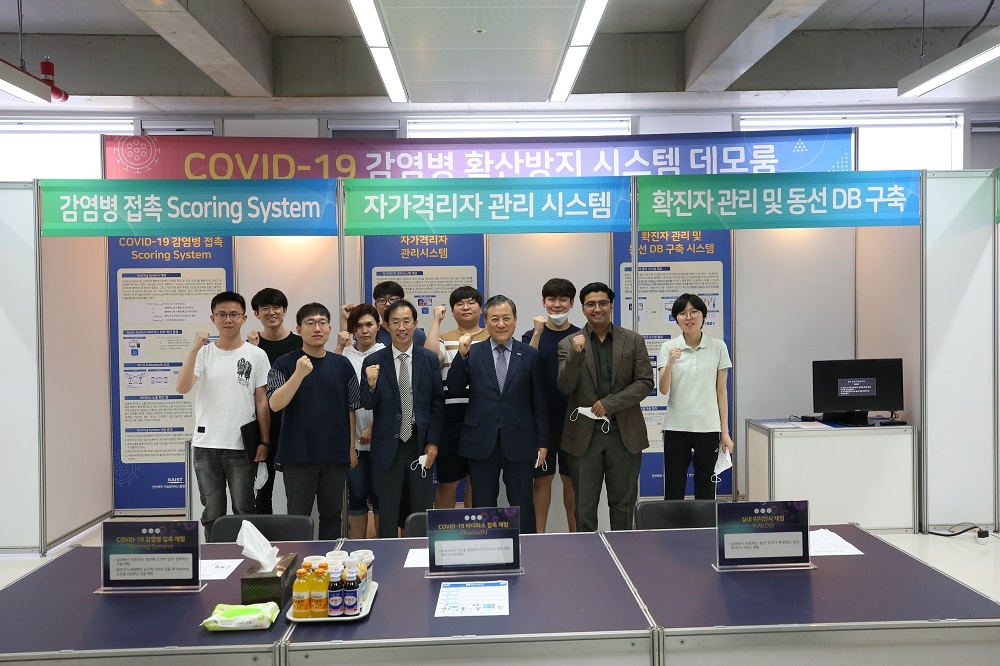KAIST develops pandemic tracking app with enhanced privacy protection
By Lim Jeong-yeoPublished : June 10, 2020 - 13:57

The Korea Advanced Institute of Science and Technology said Wednesday that it had developed “black box” software for smartphones that would facilitate the tracking of COVID-19 patients’ movements without encroaching on their privacy.
KAIST calls it “PreSPI,” short for Prevention System for Pandemic Disease Infection.
The idea that carrying a movement tracker in a phone is conducive to safeguarding personal data may sound counterintuitive, but the new system is more than that, KAIST explained.
“Think of this like an airplane black box -- it’s meant to hold all records of the aircraft’s journey, but no one opens it to see its data unless there is an accident,” professor Han Dong-soo of KAIST’s Intelligent Service Integration Lab told The Korea Herald.
“Becoming a confirmed COVID-19 patient would be the equivalent of a crash landing. Even then, the information regarding their whereabouts over the past two weeks would be transmitted in coded signals and not as the names of commercial establishments they have patronized,” Han said.
The disclosure of information about COVID-19 patients’ movements, including specific places they visited and when those visits took place, has ignited a public debate over privacy.
With the new app, the data refreshes every two weeks, the time frame deemed to be the incubation period of the SARS CoV-2 virus, automatically deleting older records.
The black box application, which can be downloaded just like any other smartphone app, will become publicly available if the South Korean government endorses it. All apps relevant to COVID-19 require government approval.
Currently, alerts about newly confirmed SARS-CoV-2 carriers can cause confusion and alarm. Members of the public have to read through the list of places an infected person has been in case they too have been exposed. But users of the app can see if they should be concerned without checking those details.
Prior to the COVID-19 pandemic, Han’s team of some 20 researchers was already fine-tuning the technology to track a device’s movement within indoor settings. The technology, called the KAIST Locating System, was first developed by Han in 2014. Currently, it can pinpoint people’s movements with an accuracy range of 3 to 6 meters within a building and can tell which level of the building they visited.
By Lim Jeong-yeo (kaylalim@heraldcorp.com)
KAIST calls it “PreSPI,” short for Prevention System for Pandemic Disease Infection.
The idea that carrying a movement tracker in a phone is conducive to safeguarding personal data may sound counterintuitive, but the new system is more than that, KAIST explained.
“Think of this like an airplane black box -- it’s meant to hold all records of the aircraft’s journey, but no one opens it to see its data unless there is an accident,” professor Han Dong-soo of KAIST’s Intelligent Service Integration Lab told The Korea Herald.
“Becoming a confirmed COVID-19 patient would be the equivalent of a crash landing. Even then, the information regarding their whereabouts over the past two weeks would be transmitted in coded signals and not as the names of commercial establishments they have patronized,” Han said.
The disclosure of information about COVID-19 patients’ movements, including specific places they visited and when those visits took place, has ignited a public debate over privacy.
With the new app, the data refreshes every two weeks, the time frame deemed to be the incubation period of the SARS CoV-2 virus, automatically deleting older records.
The black box application, which can be downloaded just like any other smartphone app, will become publicly available if the South Korean government endorses it. All apps relevant to COVID-19 require government approval.
Currently, alerts about newly confirmed SARS-CoV-2 carriers can cause confusion and alarm. Members of the public have to read through the list of places an infected person has been in case they too have been exposed. But users of the app can see if they should be concerned without checking those details.
Prior to the COVID-19 pandemic, Han’s team of some 20 researchers was already fine-tuning the technology to track a device’s movement within indoor settings. The technology, called the KAIST Locating System, was first developed by Han in 2014. Currently, it can pinpoint people’s movements with an accuracy range of 3 to 6 meters within a building and can tell which level of the building they visited.
By Lim Jeong-yeo (kaylalim@heraldcorp.com)











![[Today’s K-pop] BTS pop-up event to come to Seoul](http://res.heraldm.com/phpwas/restmb_idxmake.php?idx=644&simg=/content/image/2024/04/17/20240417050734_0.jpg&u=)




![[KH Explains] Hyundai's full hybrid edge to pay off amid slow transition to pure EVs](http://res.heraldm.com/phpwas/restmb_idxmake.php?idx=652&simg=/content/image/2024/04/18/20240418050645_0.jpg&u=20240418181020)

![[Today’s K-pop] Zico drops snippet of collaboration with Jennie](http://res.heraldm.com/phpwas/restmb_idxmake.php?idx=642&simg=/content/image/2024/04/18/20240418050702_0.jpg&u=)